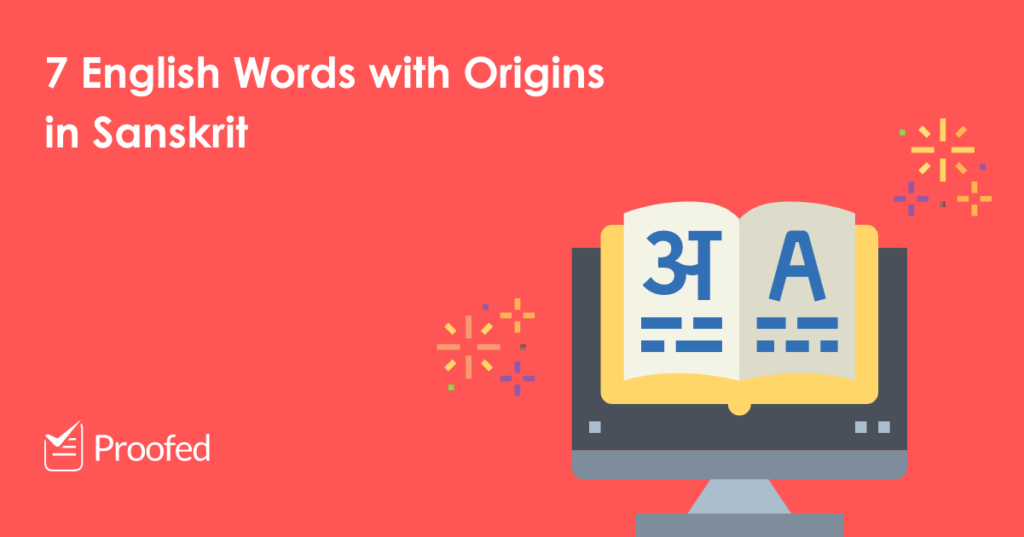Today marks the start of the five-day Hindu festival of Diwali, also known as the festival of lights. The name ‘Diwali’ comes from an early Sanskrit text, where the word dīpāwali is used to mean ‘a row of lights’.
But did you know that many other English words have Sanskrit origins? Here are seven that you might want to use in your writing.
1. Avatar (Manifestation of a Deity)
The word ‘avatar’ comes from the Sanskrit term avatāra, meaning ‘descent’. Traditionally, in Hinduism, this referred to an incarnation (i.e. an earthly form) of a deity, such as the gods Vishnu, Ganesha, and Shiva.
Non-Hindus, though, may associate ‘avatar’ more with the internet and gaming, where an avatar is the image a person chooses to embody themselves in an online world. Or you might think of James Cameron’s Avatar, where the characters placed their minds inside alien bodies!
2. Bandana (Large Handkerchief)
A bandana is a piece of cloth worn tied around the head or neck. These are usually very colourful, so it makes sense that we get the English ‘bandana’ from the Hindi bandhani, a patterned textile created by binding small parts of a piece of cloth before dyeing, similar to modern tie-dyeing.
We can then trace this to the Sanskrit word bandh, which meant ‘to tie’.
3. Cot (Small Bed)
In Australian English, a cot is a bed with barred sides for a baby or young child. And in American English, the word ‘cot’ typically refers to a camp bed.
In both cases, though, the word ‘cot’ comes from the Sanskrit khatva, meaning ‘a light bedstead’, via the Hindi word khaat.
Find this useful?
Subscribe to our newsletter and get writing tips from our editors straight to your inbox.
4. Jungle (Tropical Forest)
In English, a ‘jungle’ is a tropical forest. But in its original Sanskrit form, jangala, it referred to arid land with few trees, like a desert. And this might seem strange given that we usually associate jungles with dense vegetation!
(Photo: bere69/Pixabay)
The reason for this is that we get ‘jungle’ via the Hindi word jangaal, which referred to any uncultivated ground. This included wasteland, deserts, and forests. But its only the ‘dense forest’ sense that we kept in English.
5. Loot (Stolen Property)
The word ‘loot’ came to us, via Hindi, from the Sanskrit lotra, meaning ‘rob’. We see this in English, where ‘loot’ can be either a verb (meaning ‘steal’) or a noun (meaning ‘stolen goods’). Typically, though, the English ‘loot’ refers specifically to goods stolen during a war, riot, or another violent event.
6. Punch (Alcoholic Fruit Drink)
In English, ‘punch’ can mean either ‘a blow with a fist’ or ‘an alcoholic fruit drink’. And if these seem like very different uses, that’s because they come from different places! The similarity in English is just a coincidence.
The ‘strike with a fist’ sense of punch comes from a Latin word meaning ‘pierce or puncture’. But the alcoholic drink comes from the Sanskrit pancha, meaning ‘five’, since a traditional punch drink was made from five ingredients: alcohol, sugar, lemon, water, and tea or spices.
(Photo: Frank Vincentz/wikimedia)
7. Shampoo (Liquid for Washing Hair)
Finally, you probably use shampoo to wash your hair. But did you know that ‘shampoo’ comes from the Sanskrit term capayati, meaning ‘kneads’ (i.e. massage or squeeze with hands)? Arriving in English via the Hindi champo, this reflects the massaging motion of rubbing shampoo into your hair!
Expert Proofreading Services
Can you think of any other English words with Sanskrit origins? Let us know in the comments if so! And if you would like to get your work proofread by English-language experts, you can submit a trial document for free today.
